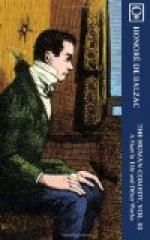This mother was in every way completed by the son, so that the son would not be understood without the mother. If the mother condemned herself to mended gloves, the son wore an olive-green coat with sleeves too short for him, proving that he had grown, and might grow still more, like other adults of eighteen or nineteen years of age. The blue trousers, mended by his mother, presented to the eye a brighter patch of color when the coat-tails maliciously parted behind him.
“Don’t rub your gloves that way, you’ll spoil them,” she was saying as Pierrotin appeared. “Is this the conductor? Ah! Pierrotin, is it you?” she exclaimed, leaving her son and taking the coachman apart a few steps.
“I hope you’re well, Madame Clapart,” he replied, with an air that expressed both respect and familiarity.
“Yes, Pierrotin, very well. Please take good care of my Oscar; he is travelling alone for the first time.”
“Oh! so he is going alone to Monsieur Moreau!” cried Pierrotin, for the purpose of finding out whether he were really going there.
“Yes,” said the mother.
“Then Madame Moreau is willing?” returned Pierrotin, with a sly look.
“Ah!” said the mother, “it will not be all roses for him, poor child! But his future absolutely requires that I should send him.”
This answer struck Pierrotin, who hesitated to confide his fears for the steward to Madame Clapart, while she, on her part, was afraid of injuring her boy if she asked Pierrotin for a care which might have transformed him into a mentor. During this short deliberation, which was ostensibly covered by a few phrases as to the weather, the journey, and the stopping-places along the road, we will ourselves explain what were the ties that united Madame Clapart with Pierrotin, and authorized the two confidential remarks which they have just exchanged.




